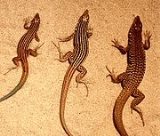
Parthenogenesis
WordNet
noun
(1) Process in which an unfertilized egg develops into a new individual; common among insects and some other arthropods
(2) Human conception without fertilization by a man
WiktionaryText
Etymology
(from ) + + (from )
Noun
-
- Reproduction by the development of a single gamete (viz. an ovum or ovule) without fertilisation by a gamete of the opposite sex; cf. , .
- 2008 October 15, "Virgin Shark Gives Birth", AFP via Australian Broadcasting Corporation:
- Scientists say the birth is the second confirmed instance of a shark being conceived by , a process in which an unfertilised egg develops into a new individual.
- 2008 October 15, "Virgin Shark Gives Birth", AFP via Australian Broadcasting Corporation:
- Asexual reproduction in toto; agamogenesis.
- An instance or example of parthenogenesis.
- Reproduction by the development of a single gamete (viz. an ovum or ovule) without fertilisation by a gamete of the opposite sex; cf. , .
- figurative uses of the biologic senses
- 1870: James Russell Lowell, Among My Books, series I, Shakespeare Once More, page 223
- We may learn, to be sure, plenty of lessons from Shakespeare. We are not likely to have kingdoms to divide, crowns foretold us by weird sisters, a father’s death to avenge, or to kills our wives from jealously ; but Lear may teach us to draw the line more clearly between a wise generosity and a loose-handed weakness of giving ; Macbeth, how one sin involves another, and forever another, by a fatal , and that the key which unlocks forbidden doors to our will or passion leaves a stain on the hand, the may not be so dark as blood, but that will not out ; Hamlet, that all the noblest gifts of person, temperament, and mind slip like sand through the grasp of an infirm purpose ; Othello, that the perpetual silt of some one weakness, the eddies of a suspicious temper depositing their one impalpable layer after another, may build up a shoal on which an heroic life and an otherwise magnanimous nature may bilge and go to pieces.
- 1870: James Russell Lowell, Among My Books, series I, Shakespeare Once More, page 223
- Virgin birth, in reference to the Virgin Mary and Jesus Christ.
-
-
-
-
-
Usage notes
- Whereas this word’s biologic and figurative senses are properly understood as deriving from the prefix in its biologic-botanic sense (stressing an absence of fertilisation), the theologic sense can only be understood as employing the prefix in the original sense of “virgin”, since parthenogenetic offspring are always female.
-
-
-
-
-

